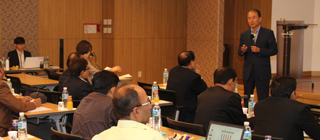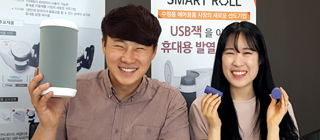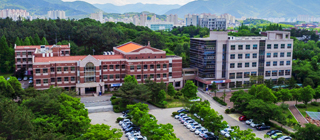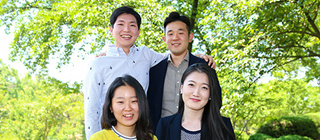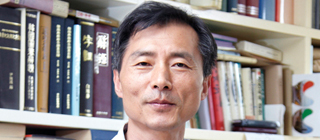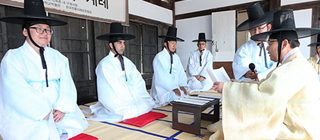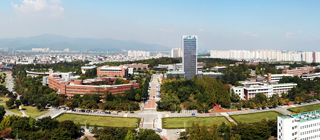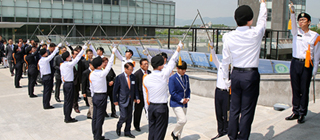-
2.9 billion won in national funding for 4 years, establish automobile function safety SW research center Develop automobile convergence parts SW and foster professional human resources Ministry of Education's prime project expected to have synergy effect with BK21 plus project [May 25, 2016] YU (President Noh Seok-kyun) was selected for the 'College ICT Research Center' pursued by the Ministry of Science, ICT and Future Planning (MSIP). On the 24th, the MSIP announced the colleges selected for the '2016 College ICT Research Center and Grand ICT Research Center'. Accordingly, YU was newly selected as a College ICT Research Center and will carry out research projects receiving national funding of 2.9 billion years over the next four years.. Upon being selected for this project, YU is planning to establish the 'Automobile Function Safety SW Research Center' to develop function safety-based convergence parts software for automobile electric components, while fostering professional manpower in relevant fields. It is planning to focus on IT and automobile technology convergence research to procure key technologies of the future automobile market that is evolving with autonomous driving automobiles and smart automobiles in order to foster professional human resources. For this, YU will pursue the project by making a consortium with automobile parts companies such as Ajin Industrial and relevant research centers. In particular, YU is focusing on expanding industry-academic education and research programs on smart automobiles for undergraduates with the Ministry of Education's Prime project mainly centered on the Department of Information and Communication Engineering, while also developing core technologies for the automobile industry linked to smart devices through the BK21 Plus Project, and fostering professionals playing pivotal roles in the IT-based future automobile industry. It is thus expected that through industry-academic cooperation with local automobile parts companies, it will contribute greatly in fostering professional human resources, while also improving the competitiveness of the regional industries and developing the local economy. Department of Information and Communication Engineering Professor Park Yong-wan who oversees the YU Automobile Function Safety SW Research Center said, "When taking into account the automobile parts industry and its ripple effect in other industries, as well as the import substitution effect through this project, it is expected that the economic effect will amount to a total of 400 billion won by 2021." He added, "Through the industry-academic-research cooperation, we will procure unparalleled technological power and foster professional manpower to lead the next-generation smart automobile and autonomous driving automobile convergence parts market." Meanwhile, taking into account the technological demands of small and medium sized businesses, as well as the Ministry of Defense's focusing on the 'K-ICT 10 strategic fields', the MSIP selected eight College ICT Research Centers such as YU, Kyunghee University, Sejong University, Chonnam National University, Chungnam National University, Seoul National University of Science and Technology, Kwangwoon University, and Ajou University, and Pusan National University as the Grand ICT Research Center.
-
Attended special lecture on Saemaul Undong at Park Chung Hee School of Policy and Saemaul High interest in the success factors of the Saemaul Undong... Followed by in-depth discussions [May 26, 2016] <World Bank WSP representatives visited YU to learn about the Saemaul Undong> The World Bank, which is one of the top 3 international economic organizations together with the International Monetary Fund (IMF) and the World Trade Organization), is showing great interest in the Saemaul Undong. The South Asian representatives of the World Bank WSP (Water and Sanitation Program) visited YU to learn about the lessons from the 'Saemaul Undong' of the 70s on the 18th. The World Bank WSP representatives visited domestic rural areas and environmental facilities to learn about Korea's rural development and hygiene facility development from the 16th to the 21st. They took out a day from their tight six day schedule to visit YU. The WSP representatives comprised of 14 mid-level government administrators in the environmental and hygiene sector and World Bank of Pakistan and Bangladesh attended a special lecture program prepared by the YU Park Chung Hee School of Policy and Saemaul (Dean Park Seung-woo). The topic of the special lecture was 'Globalization of the Saemaul Undong' [International Development Cooperation Center Director (Global Saemaul Forum Chairman) Choi Wae-chul] and 'Policies and Strategies of the Saemaul Undong' (Park Chung Hee School of Policy and Saemaul Vice-Dean Kim Ki-soo). During the special lecture, Dean Choi Wae-chul said, "Using the spirit and principles of the Saemaul Undong is very effective for overcoming global poverty and for sustainable development." He added, "It is necessary to utilize the experiences of the Saemaul Undong for water resource management and solving the water shortage problem in South Asia, as well as to improve the public health and hygiene environment." The representatives showed especially high interest on the success factors of the Saemaul Undong going much beyond the scheduled lecture time and holding Q&A sessions and discussions with Mr. Choi. Following the special lecture, the representatives invited about 90 international students studying at the Park Chung Hee School to introduce the WSP program of the World Bank, while challenging the students to show continued interest in finding solutions to the hygiene issue of emerging countries after finishing their studies and returning to their home countries. Meanwhile, the YU Park Chung Hee School of Policy and Saemaul was established in 2011 for the goal of fostering Saemaul development leaders in emerging countries and to globalize the Saemaul Undong. A total of 424 international students from 59 countries around the world enrolled to learn the Saemaul science and the development experience of Korea.
-
Choi Young-soo (Chemical Engineering, senior) and Shin Ah-young (International Economics and Business, senior) took leave-of-absence for startup and established S.Melin Samsung provides funding and the Daegu Creative Economy Innovation Center provides technical and marketing consulting High marketability verified by companies and institutes [May 30, 2016] <Co-presidents Choi Young-soo and Shin Ah-young of S.Melin, a startup company awaiting product launching after receiving investments from Samsung> News was made as Samsung made direct investments to a startup founded by YU students. This is the story of 'S.Melin', which is pursuing business by commercializing an idea. Choi Young-soo (25, Chemical Engineering, senior) and Shin Ah-young (22, International Economics and Business, senior) co-founded this company. Trusting their idea, they teamed up and took leave-of-absence from school for start-ups in their senior year. The idea that they launched in the market is the mobile hair product, 'G.Roll'. This product combines the compact size of hair rolls and the functions of straighteners. Their idea was recognized to be excellent by sweeping various startup contests such as the '1st Global Youth Startup Camp' hosted by the Small and Medium Business Administration, '2015 Gyeongbuk Women Startup Contest' and the '2015 Gyeongsangbuk-do Outstanding Venture Startup Club' awards. Furthermore, it was reviewed by Samsung Venture Investments, which is a company specializing in finding and investing in venture companies, and the Daegu Creative Economy Innovation Center, thus being recognized to have high marketability. G.Roll (mobile heated hair roll) Give volume to front and side hair in just 1 minute regardless of the time and place. This is an innovative product that is easy to carry around and cuts down the hair roll wearing time by 1/20, while lasting 3 times longer. <S.Melin's idea product, 'G.Roll'> S.Melin was recognized for the functionality of 'G.Roll' and was selected as a tenant company of 'C-Lab', which is a startup support program of the Daegu Creative Economy Innovation Center, from this year and is receiving consulting on technology and marketing. It is preparing to enter the market in full scale based on the funds invested by Samsung Venture Investments on two separate occasions - once in January and once in May. S.Melin CEO Shin Ah-young showed her confidence stating, "We have received a lot of help from startup seniors and marketing and sales channel pioneering experts since we moved into C-Lab. We are planning to launch not only in Korea, but also foreign markets such as China and Japan as well." 'G.Roll' has registered three design patents and is currently has one patent and one utility model pending, and the product is highly perfected. It also released the product in the cloud funding site, Wadiz (www.wadiz.kr) in early May prior to the official launching, where it achieved its target funding amount in just four days, showing the positive response from the market. Co-CEO Choi Young-soo said, "We participated in many startup contests and our idea became well known. Some companies even stole our idea and are selling similar products in the market. It's quite frustrating and disappointing." But he stated with an air of confidence, "People who pioneered the path of startups who start with just an idea like us have helped us greatly. We hope to be received well in the market and we will show that our product is better than imitations."
-
100 YU students share talents in Shinbang-ri, Namcheon-myeon, Gyeongsan As part of the '2nd Volunteer Day', participated in mural painting, gate painting, and door plate making A festival connected to the 'Gyeongsan Happy Town' event held by the city of Gyeongsan [June 1, 2016] <Mural painting talent sharing volunteer activities at Shinbang-ri, Namcheon-myeon, Gyeongsan> On the first day of June, when it was abnormally hot, the quiet rural town was bustling all day long with college students running around every alley of Shinbang-ri, Namcheon-myeon, Gyeongsan. Over 100 YU students came to offer their talents and volunteer in this small town of 80 or so residents. This was carried out as part of the 2nd 'YU Volunteer Day', following the first one held in Heungsan-ri, Namcheon-myeon, Gyeongsan last year. The YU students who participated in the volunteer activities used their talents to draw murals, paint gates, and make door plates. Shinbang-ri village foreman Kim Jong-jae (60) said, "It was great to have the energy in our town with young people visiting after such a long time. The town's atmosphere changed completely in just a few days." He added, "If possible, it would be great to have more of these events together with local universities." YU students worked hard to change the town not showing any concern about the hot weather. The places touched by the YU students began to clearly transform as time passed. The typical alley walls became small galleries and the dark and old gates were brightened to welcome the home owners and guests, and door plates with the names of the residents were hung on each door. Kim Jong-min (23, Fine Arts, senior) who participated in the mural painting volunteer activity said, "It was really fulfilling to utilize what I learned in my major to volunteer. It felt good to see the town look brighter and seeing the residents enjoy it." Kang Min-ji (21, Political Science & Diplomacy, senior) said, "I enjoyed volunteering with other students in various majors. I hope that more students will participate next time and enjoy the 'Volunteer Day' festivities together." Meanwhile, the volunteer activities were carried out connection with the 'Gyeongsan Happy Town' event hosted by the city of Gyeongsan. In this event hosted by the Gyeongsan General Volunteer Center, over 300 people participated including town residents, volunteers, local college students, and farmer bands. In addition to the mural painting by YU students, others also came to share their talents such as medical examinations, taking photos, and barber/beauty services. Furthermore, free food and pungmul-nori (traditional farm performances) were added to turn the quiet rural town into the center of festivities.
-
All 64 students of the 5th batch of graduates pass, 'first in nation' in passing rate for second consecutive year Of the 32 full-time faculty, 14 working professors and 17 part-time professors who are currently attorneys 3rd batch of graduates also first in nation in employment rate in legal sector, solidifying status as 'prestigious law school' [May 16, 2016] <YU Law School Overview> YU (President Noh Seok-kyun) set a new record of being first place in the nation in the rate for passing the bar exam for the second straight year, and demonstrated that it is a cradle for the legal profession. The 64 graduates of the fifth batch of the law school who graduated in February set an amazing record of 100% passing rate. In the 3rd bar exam, YU Law School was ranked second in the nation for the passing rate, and then took first place in the 4th bar exams last year, and defended its crown this year for the second straight year as it establishes itself as one of the most prestigious law schools of Korea. The Ministry of Justice recently announced those who passed the fifth bar exam. Of the 2,864 applicants, 1,581 passed the exam, and it was found that 55.2% of applicants passed, while 79.05% of the quota (2,000) passed. First-time applicants this year recorded a national passing rate of 72.75% (1,212 passed, 1,666 applied). Meanwhile, YU Law School made a great achievement of having all 64 first-time applicants who graduated this year pass the bar exam. This is not the first time for the YU Law School to achieve this. In 2014, 63 graduates of the third batch applied where 57 passed, recording a first-time passing rate of 90.47% (2nd in nation). The fourth batch of graduates last year recorded 63 out of 64 first-time applicants passing the bar exam. The secret to YU Law School's achievement was the student-oriented management policy for education, research and administrative services. The systematic academic improvement and student guidance program accumulated after opening the Law School has become an unrivaled program that is incomparable to any other program. Professor review the results of practice tests by students and hold group studies and guidance with students 2 to 3 times a week to raise the academic concentration for students. In addition, case-problem solving education and 1:1 corrective teaching programs for students falling behind are provided to upward adjust the skills of all students in the Law School. There is more than just academic support. The school actively manages the concerns and stress of students. There is a researcher exclusively in charge of Law School students at the Student Support Center who provides counseling on the concerns of students and looks for solutions. It is very popular among students and is sought after by students all day long. <YU Law School Mock Court> Scholarships reaching 50% of the tuition and the excellent faculty are already well known. Of the 32 full time professors, 14 have background as judges, prosecutors or attorneys. These full-time professors gave up their vacations and come to school to offer special lectures and to provide guidance for group studies. These practical professors are assigned 1:1 with students who are hoping to become law clerks and prosecutors. 17 part-time professors who are currently in the legal profession are also taking charge of practical education. Former Supreme Court Justice Bae Gi-won, Former Judicial Policy Research Institute Director Choi Song-hwa, and Former Public Prosecutor General Jung Sang-myung served as chair professors, and Former Supreme Court Justice Cha Han-sung is providing guidance to students as a chair professor. Furthermore, desks in the reading room were all changed to 30cm larger desks for the convenience of students when the study. The students were taken into consideration in all of the convenience facilities as well such in the 24 hour study hall, rest lounge, sleeping room, kitchen, and shower room. In particular, the faculty even delivered midnight snacks for students studying late into the night as they provided both physical and mental support. The Law School Director Geum Tae-hwan said, "YU Law School has been reorganizing its system to become optimized for students to study, and we are now nearly in the completion phase," and added, "The united efforts of professors, employees and students with the full support of the university made it possible to have such great results." YU President said, "We had outstanding results being first place in the passing rate for bar exams for the second consecutive year, as well as a passing rate of 100%. This was possible because all members of the university including professors, students and employees worked together," and added, "The university will continue to provide support so that it can become firmly established as a prestigious law school." Meanwhile, the YU Law School has also made impressive achievements in employment rates of graduates. According to data submitted by the Ministry of Education to the National Assembly's Legislative & Judiciary Committee, YU ranked first in the nation with 67.1% in the legal profession employment rate compared to the 3rd batch of law school graduates in the 25 schools nationwide (2,000 student quota). The average employment rate in the legal sector for the 3rd batch of the 25 universities was 44.9%. YU ranked second (80%) in general employment rates (national average employment rate compared to 3rd law school quota 69.2%), and is thus solidifying its status as a prestigious law school.
-
Ministry of Foreign Affairs Overseas Public Diplomacy Field Training Center sends 12 people such as interns from Gyeongbuk overseas Field work in the Korean embassies in Turkey and Bulgaria, and company in the US Raising global competitiveness through language training and exchange student programs offered by the university [May 18, 2016] <YU students selected for overseas internship programs hosted by the government and provincial authorities, and preparing to go overseas> (clockwise from rear left, Nam Dong-woo, Kim Jae-geon, Han Bo-ra, Yang Ha-eun) YU (President Noh Seok-kyun) students were selected en masse as overseas internship program participants hosted by the government and local authorities and are receiving attention as global talents. Recently, two YU students were selected by the Ministry of Foreign Affair's Public Diplomacy Field Training Center and 10 YU students were selected for the '2016 College Student Overseas Intern Project' overseen by Gyeongsangbuk-do. Thus, a total of 12 YU students were verified by the government and provincial authorities and are waiting to be dispatched overseas. The Overseas Public Diplomacy Field Training Center project is overseen by the Ministry of Foreign Affairs to provide an opportunity for understanding and field experience in public diplomacy activities for college students, and the students selected earlier this year will work for six months. YU students selected for this are Yang Ha-eun (23, Biotechnology, senior) and Han Bo-ra (23, English and English Literature, senior), and they will be in charge of public diplomacy support operations at the Korean embassies in Turkey and Bulgaria, respectively. Miss Yang, who will be going to the Korean Embassy in Turkey in July, is an expert on Turkey. She went on a one-year language program to Turkey in 2013 to learn the Turkish language, and last year at the Daegu District Court, she has served as a translator and interpreter in Turkish. Miss Yang said she became interested in Turkey after the football match Turkey in the 2002 Korea-Japan World Cup and said, "I want to learn more about the public diplomacy culture by working at the embassy." Miss Han is the model YU global talent systematically fostered through YU's global programs. Miss Han studied in the US for one semester through the language study program provided by YU. She then went to the Netherlands as an exchange student for one year to a sister university, and has the dream of working at a Korean embassy abroad. Miss Han said, "When I went to the Netherlands as an exchange student, I taught foreigners Korean and served Korean food that I made, as part of my efforts to share Korea as a private ambassador." She added, "I made my portfolio based on those experiences and applied for the internship, and I received good results." YU students are also receiving high expectations in foreign companies. Ten YU students were selected for the 8th College Overseas Internship Program in 2016 hosted by Gyeongsangbuk-do. A total of 293 students were dispatched to this project so far, and 174 of them (59.4%) were YU students, thus being recognized for their global competitiveness. The selected students will engage in various activities such as trade, finances, HR and marketing at H Mart and Seoul Trading located in New Jersey for one year. Unlike the overseas institute interns, they will work in specialized fields of companies and are expected to gain both global sensitivities and practical abilities. Kim Jae-geon (23, International Economics and Business, senior), who will be working in the trade part of Seoul Trading in the US from July, said, "I wanted to utilize my major and work in trade after graduating. This internship will be a great experience." Also, Nam Dong-woo (24, Business Administration, junior), who will work at H Mart from December, said, "During this internship, I will make networks with as many people as possible and gain various experiences." Though their countries and institutes are different, they all have clear goals and are the future global leaders. They agreed that, "It is interesting enough to go out into the bigger world to make relationships with various people and to learn new things," and they added, "We will come back as global talents who are competitive anywhere in the world." When asked about the strengths of YU students in overseas internship programs hosted by the government and local authorities, YU External Cooperation Office Director Shin Seung-hun said, "It means that they have been recognized for not only their global capacities such as language, but also work capacities" and added, "We will continuously expand overseas internships, exchange student, and backpacking programs in addition to the overseas internship programs provided by outside institutes so that YU students can gain more global competitiveness."
-
Since Japanese version in 2006 and Chinese version in 2011, translated version in Korean published this year First academic book of 'Jung Byung-gyu Edition' established by Korea's first North Korean Designer Jung Byung-gyu Plans to author trilogy including <Modern Doctrines of Wang Yangming of East Asia> and <Contemporary Doctrines of Wang Yangming of East Asia> [May 20, 2016] YU Professor Choi Jae-mok (55, photo below), an authority in Doctrines of Wang Yangming in Korea, published a book in Korea since writing <Doctrines of Wang Yangming of East Asia> (Jung Byeong-gyu edition, translated by Lee Woo-jin) after 25 years. 'Doctrines of Wang Yangming of East Asia' was the PhD thesis written by Professor Choi in 1991 at the University of Tsukuba, and it was published in Japan by the famous Japanese publisher Pelican Press in 2006. In 2011, the Chinese version was published by the Taiwan University Press. This book was recognized as an essential book to read for experts in the field. It was recommended in the past by Professor Tu Weiming of Harvard University, Professor Kojima Yasunori of the International Christian University in Japan and Chien Ming, the chief of the International Wang Yangming Research Center in Zhejiang, China. After publishing the Korean version, it will also be translated into English. This book was published in March after three years of translation by Dr. Lee Woo-jin (Academy of Korean Studies), a young scholar majoring in the Doctrines of Wang Yangming in Korea. It is a 730 page book that shows the progression of the Doctrines of Wang Yangming in the three East Asian regions such as China, Korea and Japan, and includes over 2,000 footnotes to help readers understand the contents. It can be called a 'Study on Modern Philosophy History of East Asia Seen from the Perception of the Doctrines of Wang Yangming' as it compares the development and processes of the Doctringes of Wang Yangming for the three countries. The Doctrines of Wang Yangming are a system of thoughts that share common traits in the three areas of East Asia, and studies on this were carried out by region. Professor Choi chose a new method to understand the 'universality of the Doctrines of Wang Yangming' and 'peculiarities of each region' to overcome the limitations of past studies through his book. Professor Choi is planning to make three editions following <The Doctrines of Wang Yangmin of East Asia> followed by <Modern Doctrines of Wang Yangmin of East Asia> and <Contemporary Doctrines of Wang Yangmin of East Asia>. This book is receiving even more attention as it is the first academic book for 'Jung Byeong-gyu Edition', which is a publishing company established by Jung Byung-gyu, who is called Korea's first book designer. Professor Choi majored in East Asian Philosophy and Philosophy History (Doctrines of Wang Yangming) at the University of Tsukuba in Japan where he earned his master's and PhD, and is currently serving as a professor at the YU Department of Philosophy since 1991. He also conducted researcher as a visiting scholar or guest researcher at Harvard, Tokyo University, Leiden University of the Netherlands, and is the chairman of the Korean Association of Japanese Thought. His major works include <Doctrines of Wang Yangming of East Asia>, <My Heart is the Lamp: The Life and Philosophy of Wang Yangming>, <Toegye Shimhak and Wang Yangming>, <Lao-tzu>, and <Eastern Philosopher Visits Europe>.
-
Traditional customs and gwanrye and gyerye event for 44th 'Coming-of-Age Day' International students wear gat and binyeo to experience the charms of Korean traditional culture [May 16, 2016] <iframe width="560" height="315" src="https://www.youtube.com/embed/bRzF_jygRm4" frameborder="0" allowfullscreen="" style="margin: 0px; padding: 0px; border: currentColor; border-image: none"> <iframe> <44th Coming-of-Age Day 'Traditional Coming-of-Age Ceremony with International Students'> At 10 a.m. on the 16th, at the Gugye-seowon in the YU Gyeongsan Campus Folk Village, international students with gat (traditional hat for men) and binyeo (ornamental headpiece for women) attended the 'traditional coming-of-age ceremony' of Korea. YU (President Noh Seok-kyun) offered a traditional coming-of-age ceremony event for international students for the 44th 'Coming-of-Age Day'. During 'gwanrye', which is the first of the four ceremonial occasions of coming-of-age, the honorary guest, YU President Noh Seok-kyun recited words of congratulations for the futures of the male students who became 20 years old. They wore the chipogeon, yugeon, and the gat, which is the third headpiece, and tied a knot to announce that they have become adults. 'The Coming-of-Age Day' is a legally designated commemoration date held on the third Monday of May. It is a day to naturally tell young adults who became 20 about the duties and responsibilities of becoming an adult, and to congratulate them from growing out of puberty and becoming matured both physically and mentally. At this traditional coming-of-age ceremony, a total of eight students, including six international students from Afghanistan, Philippines and China wore traditional clothes called dopo and dangui and participated in the 'gwanrye' and 'gyerye' ceremonies. Hadi Farid Ahmad (25) from Afghanistan who was admitted to the graduate school program at the YU Park Chung Hee School of Policy and Saemaul said, "I wanted to learn as much as possible about Korean culture while studying here. Experiencing this traditional coming-of-age ceremony was a very meaningful experience." He added, "I was able to learn about the charms of traditional Korean culture that teaches the pride and responsibilities of becoming an adult." Gwanrye is a ceremony of placing three gwan, or head pieces, to men who became 20 years old and emphasizes their responsibilities to their family, relatives, and country. it is completed with tying the hair up in a not and wearing three hats, and the bunri-ceremony of changing clothes, and is completed with a drink of alcohol and announcing to the heavens that one has become an adult. It also includes the myeonjarye ritual of giving an 'alias' to be used instead of one's name as a symbol of protecting one's body and name that was given to them by their ancestors. Gyerye is a ceremony of untying a girl's hair and placing a binyeo, which is an ornamental hair piece, in the hair to announce that a girl has become an adult. YU President Noh Seok-kyun, who watched the entire traditional coming-of-age ceremony for an hour and a half, said, "I hope that by participating in the traditional gwanrye and gyerye events, you will be able to understand the meaning of becoming an adult, and gain a deeper understanding on our culture." He added, "Becoming an adult is being responsible for your actions. Please remember the meaning of wearing the gwan and receiving an alias and go forward with your dreams in this global era."
-
Pursuing industry-customized talent fostering projects Newly establish College of Mechanic IT, Department of Automobile Mechanical Engineering, Department of Robot Engineering Pursuing two-track plans to foster humanities and basic academics [May 3, 2016] YU (President Noh Seok-kyun) for the Ministry of Education's PRIME (PRogram for Industrial needs - Matched Education) Project' (hereinafter 'PRIME Project'). On the 3rd, the Ministry of Education and the National Research Foundation announced that they selected a total of 21 universities to receive support for the PRIME Project. According to this, YU will receive approximately 15 billion won in national funding annually amounting to around 45 billion won for three years up until 2018. In addition to YU, nine universities such as Konkuk University, Kyungwoon University, Dong-Eui University, Sookmyung Women's University, Soonchunhyang University, Wonkwang University, Inje University, and Hanyang University (ERICA) were selected as social demand leading universities (large-scale projects), while a total of 12 universities from the five regions of Seoul, Daegu/Gyeongbuk/Gangwon, Southeast, Chungcheong, and Honam/Jeju were selected as creation-based leading universities (small-scale). With the selection for this project, YU procured approximately 45 billion won in national funding and is planning to concentrate on fostering the smart robot, future automobile, convergence materials, and chemical sectors, which are future growth engine fields. In order to foster talents for these industries, YU is planning to separate the electric, electronics, computer, information communication, and mechanics majors in the College of Engineering to establish the College of Mechanics IT, while newly establishing the Department of Robot Mechanic Engineering and Department of Automobile Mechanical Engineering. Plans are set to increase the 1,100 newly admitted students this year in the College of Engineering to a total of 1,400 by separating it into the College of Mechanic IT and College of Engineering. YU is planning to increase the student quota in mechanics, electric, electronic, computer, and chemical engineering sectors, which the university has traditionally been strong in, while fostering departments related to convergence materials and renewable hybrid and accelerate reorganization of futuristic departments. Therefore, it is expected that they will realize college education that meets future industry demands, and create mutual growth and synergy among the departments. In addition to this, YU will foster talents in humanities to fit the changing times by completing reforming its humanities sector. In order to strengthen its humanities education, YU is planning to improve its school system and develop the so-called 'YU-MOOC (Massive Open Online Course)' contents to promote the humanities disciplines in its multi-faceted efforts to develop the humanities and basic academics. YU President Noh Seok-kyun said, "We will foster excellent human resources through educational reorganization that reflects social changes in connection with the major industries of the Daegu-Gyeongbuk regions. Furthermore, we will increase communication between the university and society by promoting research in the basic academic sectors and industry-academic cooperation." Meanwhile, the 'PRIME Project' is a large-scale national funding project beginning this year with the goal of resolving the mismatch of human resources through college reorganization to fit the social changes and industry demands. Starting with approximately 200 billion won in 2016, it will provide a total of 600 billion won by 2018.
-
100 alumni in Seoul visit YU for 6th straight years to spend two days and a night with juniors Former Minister Jeon Jae-hee, Yuhan Corporation CEO Lee Jung-hee, Football Coach Shin Tae-yong, Movie Director Cho Jin-gyu and more Leaders in different parts of society holds 'Talk Concert' with juniors [April 29, 2016] <Alumni from Seoul hold the alma mater visiting event for the 6th straight year> “It is the sixth year this year to visit our alma mater together with alumni currently in Seoul since 2011. As always, I had a hard time going to bed over the thought of meeting our juniors. Remember that we are not here physically any longer, we are always rooting for YU and our juniors!” YU Seoul Alumni Chairman Yoon Sang-hyun (66, Commercial Science '69, CEO of Ilshin Electronics) visited his alma mater YU with high expectations to meet his juniors. At 12:30 p.m. on the last Friday of April, Mr. Yoon Sang-hyun and other 'power leaders' leading Korea gathered at YU. Over 100 alumni working in various parts of society took time out from their busy schedules and took buses to go on a four hour ride to visit their alma mater. This is a scene that cannot be seen in any other university of Korea. This homecoming day event has continued for the sixth year already. Former Minister of Health and Welfare Jeon Jae-hee (66, Public Administration '68), Yuhan Corporation CEO Lee Jung-hee (64, English and English Literature '71), Kunil Engineering CEO Sohn Il-soo (59, Civil Engineering '75), Chungmu Law Firm Main Attorney Seo Young-deuk (57, Law '78), Ecopro CEO Lee Dong-chae (56, Business Administration '78), Movide Director Cho Jin-gyu (55, Painting '80), Korean Olympic Football Head Coach Shin Tae-yong (45, Physical Education '88), and others in politics, finance, culture, and sports all gathered together. YU prepared a welcoming event and luncheon for the alumni who took time from their busy schedules, and YU President Noh Seok-kyun, appointed professors, and the president of the student body stated their appreciation. When Mr. Yoon Sang-hyun said in his greeting speech, "The alumni who gathered here today will share all of the knowledge and experiences we gained to our juniors." YU President Noh Seok-kyun then replied, "Our senior alumni's interest for our school and love for juniors are of great help to the development of our school. I trust that your juniors will follow your examples and become leaders of Korea." Student body president Kwang Byung-chul (28, School of Materials Science and Engineering, senior) gave Mr. Yoon Sang-hyun flowers to welcome him on behalf of the students, while saying, "We are very proud of the fact that our seniors are active as leaders in different part of society." He added, "Even now, your juniors including myself are working hard to fulfill our role in society. We will do our best to continue your legacies." After the welcoming luncheon, a 'Talk Concert' with juniors was held at the Cheonma Art Center from 2:30 p.m. Students filled up the 500 seat Chamber Hall to listen to the experiences and advice of their seniors. The talk concert, which was emceed by Attorney Seo Young-deuk, was joined by Former Minister Jeon Jae-hee, Yuhan Corporation CEO Lee Jung-hee, Ecopro CEO Lee Dong-chae, Movie Director Cho Jin-gyu, Coach Shin Tae-yong, Misil Farm CEO Shin Sang-bo (Chinese and Chinese Literature, '92), Fill Architecture CEO Lee Sang-hyun (Architecture, '79), and Korean Intellectual Property Office Judge Jung Da-won (Pharmacy, '83). <Alumni from Seoul holding talk concert with juniors> Former Minister Jeon Jae-hee said, "Together with the title of being the first woman in Korea to pass the public administration examination, I have walked the path of a minority and came to where I am today. In order for the few to lead the majority, great efforts are needed. This is a beautiful thing." She added, "You should also not be afraid of taking the path of the minority." Olympic Head Coach Shin Tae-yong said, "I became the first to graduate from a university outside of Seoul to become the head coach of the Olympic team. I don't think there are limitations just because of the region of your university. I achieved many things, but now I am racing toward another goal to become the head coach of the World Cup Team." He added, "If you trust in yourself and use your energy, you will be able to achieve your goals." After the talk concert, dialogues between alumni and students continued in meetings by departments, and the alumni gave their advice and encouragement as social leaders and senior alumni.

